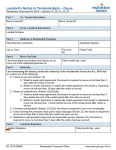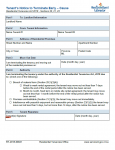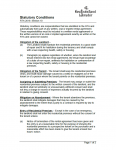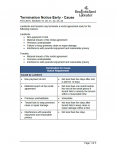Statutory conditions
10. (1) Notwithstanding an agreement, declaration, waiver or statement to the contrary, where the relationship of landlord and tenant exists, there shall be considered to be an agreement between the landlord and tenant that the following statutory conditions governing the residential premises apply:
1. Obligation of the Landlord -
(a) The Landlord shall maintain the residential premises in a good state of repair and fit for habitation during the tenancy and shall comply with a law respecting health, safety or housing.
(b) Paragraph (a) applies regardless of whether, when the landlord and tenant entered into the rental agreement, the tenant had knowledge of a state of non-repair, unfitness for habitation or contravention of a law respecting health, safety or housing in the residential premises.
2. Obligation of the Tenant - The tenant shall keep the residential premises clean, and shall repair damage caused by a wilful or negligent act of the tenant or of a person whom the tenant permits on the residential premises.
3. Assigning or Subletting Residential Premises - The tenant may assign or sublet the residential premises subject to the written consent of the landlord, and the landlord shall not arbitrarily or unreasonably withhold consent and shall not levy a charge in excess of expenses actually incurred by the landlord in relation to giving consent.
4. Mitigation on Abandonment - Where the tenant abandons the residential premises, the landlord shall mitigate damages that may be caused by the abandonment to the extent that a party to a contract is required by law to mitigate damages.
5. Entry of Residential Premises - Except in the case of an emergency, the landlord shall not enter the residential premises without the consent of the tenant unless
(a) notice of termination of the rental agreement has been given and the entry is at a reasonable time for the purpose of showing the residential premises to a prospective tenant or purchaser and a reasonable effort has been made to give the tenant at least 4 hours' notice;
(b) the entry is made at a reasonable time and written notice of the time of the entry has been given to the tenant at least 24 hours in advance of the entry; or
(c) the tenant has abandoned the residential premises under section 31.
6. Entry Doors - Except by mutual consent, neither the landlord nor the tenant shall, during the use or occupancy of the residential premises by the tenant, alter a lock or locking system on a door that gives entry to the residential premises.
7. Peaceful Enjoyment and Reasonable Privacy -
(a) The tenant shall not unreasonably interfere with the rights and reasonable privacy of a landlord or other tenants in the residential premises, a common area or the property of which they form a part.
(b) The landlord shall not unreasonably interfere with the tenant's reasonable privacy and peaceful enjoyment of the residential premises, a common area or the property of which they form a part.
8. Disconnection of Services - A landlord or tenant shall not, without the written consent of the other party to the rental agreement, disconnect or cause to be disconnected heat, water or electric power services being provided to the residential premises.
(2) Where a landlord and tenant enter into a written rental agreement, the statutory conditions set out in subsection (1) shall be reproduced in the rental agreement without variation or modification.
Notice where landlord contravenes peaceful enjoyment and reasonable privacy
23. (1) Notwithstanding subsection 18(1) and paragraph 18(3)(a), where a landlord contravenes statutory condition 7(b) set out in subsection 10(1), the tenant may give the landlord notice that the rental agreement is terminated and the tenant intends to vacate the residential premises on a specified date not less than 5 days, but not more than 14 days, after the notice has been served.
(2) In addition to the requirements under section 34, a notice under this section shall
(a) be signed by the tenant;
(b) state the date on which the rental agreement terminates and the tenant intends to vacate the residential premises; and
(c) be served in accordance with section 35.
Notice where tenant contravenes peaceful enjoyment and reasonable privacy
24. (1) Notwithstanding subsection 18(2) and paragraph 18(3)(b), where a tenant contravenes statutory condition 7(a) set out in subsection 10(1), the landlord may give the tenant notice that the rental agreement is terminated and the tenant is required to vacate the residential premises on a specified date not less than 5 days after the notice has been served.
(2) In addition to the requirements under section 34, a notice under this section shall
(a) be signed by the landlord;
(b) state the date on which the rental agreement terminates and the tenant is required to vacate the residential premises; and
(c) be served in accordance with section 35.





